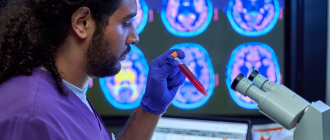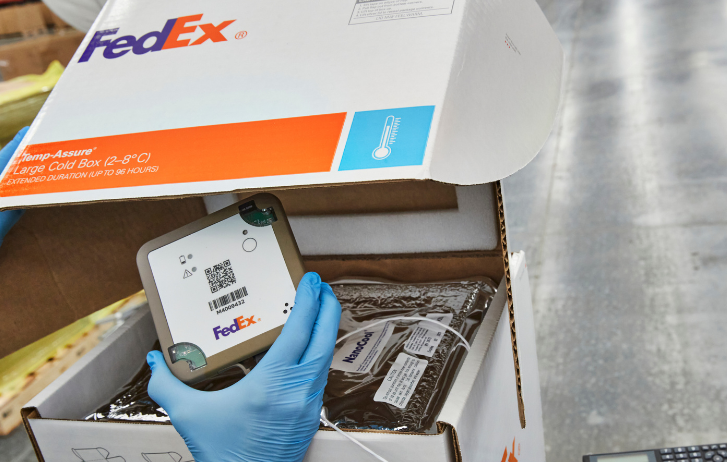
Four Ways Generative AI Is Transforming Healthcare Beyond 2025
By Kawal Preet | First published: May 3, 2024 Updated: July 15, 2025
From predictive diagnostics to pharma supply chains, AI solutions in healthcare are transforming how we deliver, manage, and experience care. Kawal Preet explores how generative AI is redefining healthcare in 2025 – improving outcomes, boosting efficiency, and keeping humanity at the heart of innovation.
- Advancements in AI technology are reshaping the healthcare industry as the solutions move from experimental phases to standardized applications.
- These solutions are improving diagnostic capabilities through enhanced accuracy, supporting real-time decision-making in surgery, and increasing efficiency for clinicians.
- AI solutions are helping healthcare transform to become more intelligent and efficient while remaining powered by compassionate, caring professionals.
The integration of AI solutions in healthcare has fully arrived. As of mid-2025, organizations are no longer simply experimenting with AI – they’re standardizing and scaling AI across care, operations, and logistics.
AI solutions in healthcare have also already revolutionized the way we diagnose, treat, and manage health, with more people even turning to generative AI tools like ChatGPT to answer their health concerns.
The question reflects a broader shift in patient behavior: turning to AI not just for information, but for interpretation and insight. It’s a sign of how embedded AI solutions in healthcare have become in our daily lives and our health systems.
Of course, there is much to consider about how AI will be used in healthcare – but it is already transforming the medical field at speed, making healthcare more efficient, effective, and accessible.
Here are four critical areas where AI technology in healthcare is making the most profound impact.
1. Enhancing diagnostic accuracy with AI medical diagnosis
Just two years ago, we viewed generative AI as a “new frontier.” Today, we are seeing supercharged AI solutions in healthcare that are redefining diagnostic medicine – not by replacing physicians, but by expanding what’s possible. What sets AI apart is its ability to interpret vast volumes of medical data in real time, spotting correlations and anomalies that might otherwise be missed.
For example, Microsoft’s AI Diagnostic Orchestrator (MAI-DxO) recently demonstrated its potential by correctly diagnosing 85.5% of complex medical cases in a controlled test. In contrast, doctors working without decision-support tools got it right only 20% of the time.
Beyond general diagnosis, AI is also making inroads in specialized screenings. A South Korean startup is using AI for retinal scans to detect early signs of various diseases. Its expansion to hospitals in Europe and the Middle East reflects how scalable and borderless AI technology in healthcare and diagnostics can be.
The future of AI medical diagnosis isn’t a single breakthrough, but a collaboration of tools working in tandem. The ability to detect, flag, and recommend next steps within seconds makes AI medical diagnosis a foundational pillar in future-ready healthcare.
2. Supporting real-time decision-making in surgery
Operating rooms today resemble high-tech mission control centers, where speed, precision, and split-second decisions can mean the difference between life and death. A combination of robotics and real-time AI analysis is transforming surgical care, as AI healthcare solutions guide surgeons during procedures and support clinical decision-making through real-time intraoperative data, robotic-assisted incisions, and advanced imaging integration.
Some examples include:
- Embodied AI (EmAI), which plays a pivotal role by interpreting multimodal data streams, such as from MRI scans or tactile feedback from surgical tools, in real time. These robotic systems can interact with and learn from the real world through sensory input and physical actions, organizing procedures into individual steps and adapting surgical plans dynamically. With EmAI, surgeons can deliver new levels of precision in complex operations.
- Robotic arms that have become intelligent collaborators, assisting with the most delicate incisions. Guided by machine learning models, they improve accuracy and reduce the risk of complications.
- AI-powered decision support systems, which are being applied in many leading hospitals. These tools monitor surgical video and patient vitals in real time to detect risks early and flag complications before they escalate.
This fusion of human skill and AI precision exemplifies how generative AI is transforming healthcare. It brings new agility to the operating room, allowing surgeons to anticipate challenges and respond with speed, confidence, and accuracy.
FedEx’s Surround monitoring and intervention solution supports industries, including healthcare, by providing critical updates to ensure the timely delivery of sensitive shipments such as clinical trial samples, vaccines, and organ donations.
3. Freeing up clinicians through AI-driven support
One of AI’s biggest value-adds is its ability to take on low-skill or mundane tasks, freeing skilled professionals from the grind of documentation, scheduling, and billing. AI in healthcare is no different.
Many hospitals and clinics use AI-powered medical scribes to automate patient documentation, which can free up to two hours of physician time daily. In fact, AI scribes have resulted in 84% of physicians reporting improved patient interactions, and 82% noting better job satisfaction, as well as a 60% reduction in reported burnout.
Intelligent scheduling and resource optimization can further improve patient flow. Generative AI can also be used for administrative tasks, such as insurance authorization and real-time patient triage.
AI can also take some of the burden off businesses – including those in healthcare – required to deliver real-time, round-the-clock customer service support. At FedEx, for example, customers who call our customer hotline might be greeted by our AI-powered Intelligent Virtual Assistant (IVA), which is designed to interact and engage with users through natural language processing.
It can answer a broad range of queries with intelligence and even send SMS links for bookings and status tracking, transforming the way we help solve customer pain points.
Customers can still speak to an agent for more complex issues – but as the IVA is available 24/7, this AI tech enables customers to reach us beyond regular business hours.
4. Revolutionizing pharma supply chains and preventative healthcare
AI solutions in healthcare are also transforming pharma logistics. FedEx has long managed end-to-end critical healthcare shipments, and today, sensor-based tech, near real-time tracking, and AI predictive analytics work together to maintain shipment integrity and optimize delivery routes. FedEx’s Surround monitoring and intervention solution supports industries, including healthcare, by providing critical updates to ensure the timely delivery of sensitive shipments such as clinical trial samples, vaccines, and organ donations.
The FedEx Surround dashboard uses AI to provide near real-time global visibility and predictive analytics for potential disruptions in the shipping process. It also provides SenseAware ID, a lightweight sensor that transmits package location data every two seconds to help customers make fast, informed decisions.
This is a glimpse of how healthcare management AI is shaping pharma logistics, bringing greater precision, responsiveness, and intelligence to the last mile of care.
The future of AI solutions in healthcare is powered by people
It is easy to see how quickly AI in healthcare transforms, leaving traditional models of patient care or product and R&D behind. In fact, 75% of healthcare organizations are now actively scaling generative AI solutions, with governance frameworks in place for responsible use. The market for generative AI in healthcare is projected to reach nearly USD 17 billion by 2034, driven by demand for efficiency, safety, and precision care.
However, clinicians and patients alike cite worries about data privacy, algorithmic bias, and loss of human touch, which is a potential issue when trust and transparency are crucial to widespread adoption.
In 2025, AI isn’t about replacing healthcare professionals – it’s about amplifying them. As the healthcare sector continues to embrace AI medical diagnosis, generative treatment planning, and healthcare management AI, the focus must remain on patient outcomes and compassionate care.
The future of healthcare is intelligent, efficient, and deeply human. It may be driven by AI, but it’s powered by people.
***
Learn more about FedEx’s healthcare logistics solutions here.
SHARE THIS STORY
- 85% Of APAC Businesses Plan To Expand Into Europe, According To New FedEx Report
- Generative AI: A New Frontier
- How To Ship A Giant Panda
- The Rise Of Intra-Asia Trade: Opportunities In The China-Southeast Asia Corridor
- Where Do Old Planes Go When They Retire?
- What’s So Dangerous About Coconuts? Your Guide To Dangerous Goods Logistics
Sign up now and save on your shipping rates!
Sign up now and earn discounts by shipping instantly with FedEx Ship ManagerTM at fedex.com.
Recommended For You

Generative AI: A New Frontier
The applications for genAI seem limitless. See how small businesses are using genAI for efficiency, digital transformation and growth.
Read More
How Technology Is Shaping The Future Of Healthcare Logistics
From real-time data to predictive analytics, our digital technologies streamline the process of moving medical supplies and healthcare products.
Read More
The Next-Gen Sensors Transforming Healthcare Logistics
Healthcare shipments require delicate handling. The right sensor technology ensures products are transported safely.
Read More


